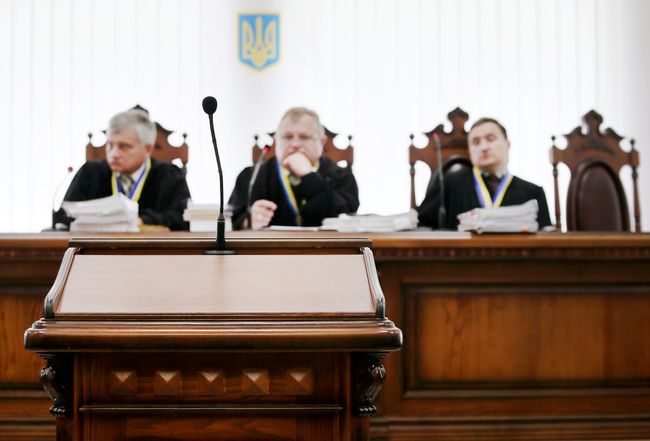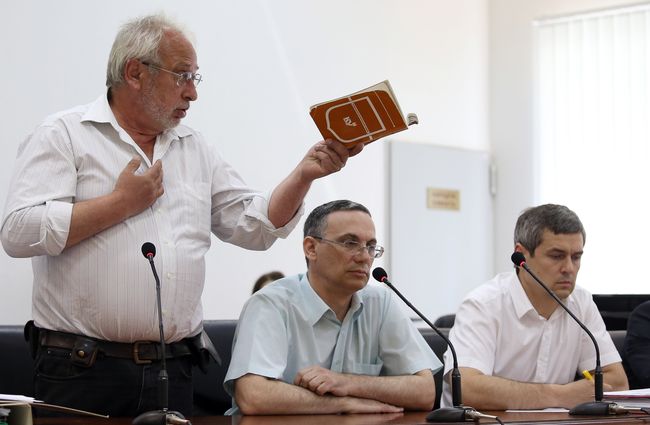Week under sign of Gongadze-Podolsky case
An unprecedented trial of Pukach continues daily at the Court of Appeal. What is particular?
An action-packed serial based on real events is going on before our eyes. It is about a tragedy, human destinies, influences, careers, and struggle. A true history of our country is being written here. Again, it is about the high-profile Gongadze-Podolsky case. The past week has been under its sign. The Appeal Court of Kyiv has been holding daily, since Monday, a trial of ex-General Oleksii Pukach, the chief perpetrator of the murder of journalist Georgiy Gongadze and the beating-up of public activist Oleksii Podolsky.
The continuing face-off is between the injured party, i.e., Oleksii Podolsky, and the defendant Oleksii Pukach, on the one hand, and Valentyna Telychenko, who represents Myroslava Gongadze at the trial, Prosecutor General’s Office representatives, and the board of justices with Stepan Hladii at the head, on the other. It may look surreal at first glance that the injured party and the defendant or the injured party’s representative and public prosecutors should be taking similar stands. But the behavior lines of the parties to the trial have intertwined so much that this needs to be explained.
“It is not in fact Pukach who beat me up and killed Gongadze, for he was just doing what he was ordered to do,” Oleksii Podolsky comments to The Day. “Yes, Pukach is a criminal and a murderer who must take punishment. I am not defending him – his place is surely behind bars. But punishment must be meted out to those who issued him orders to commit these crimes. Pukach is the instrument of crimes. My goal is not just to have Pukach sent to prison, where he may be killed, but to have the crime organizers punished. Therefore, all those journalists, public activists, plus Valentyna Telychenko, who allege that I am shielding Pukach, are doing this deliberately, thus defending those who ordered these high-profile crimes.”
As for Valentyna Telychenko’s position, she said recently, withdrawing the injured party’s appeal: “Today, taking into account that pretrial investigation was finished and Pukach was taken into custody in July 2009, and that the sentence was passed on the basis of duly cleared-up circumstances and just punishment was imposed on him, we consider it unnecessary at this stage to level new charges against Pukach. His punishment – life imprisonment – is harsh anyway. And I want to emphasize it to journalists that the absence of an item about a contract killing does not mean that prosecutors should not go on investigating the crime organizers’ case.”
But prosecutors have been reluctant for 15 years to investigate this high-profile case, as far as organizers are concerned. We have all seen that, while presidents and prosecutor generals change one another, the crime organizers still remain at large. There was an attempt during Viktor Yanukovych’s presidency to bring ex-president Leonid Kuchma to justice – even criminal proceedings were instituted, but the case never went to court. As it turned out, opening a case against Kuchma was for Yanukovych just a way to pressure this family and, in the words of ex-first deputy prosecutor general Renat Kuzmin, there were also commercial motives behind this. This resulted in a situation when Yanukovych showed himself as the best learner of Kuchma’s methods, which brought this country to a tragedy – the loss of territories and thousands of human lives.
Unfortunately, the situation in this high-profile case has not changed after the Euromaidan. Podolsky’s side, the public, and journalists (by no means the majority) are still struggling not only at the trial itself, but also against the old judicial and law-enforcement structure, against the whole Kuchma-Yanukovych system. What is now going on in the courtroom is the proof of this. The past week has seen a lot of events in the courtroom, whose details cannot be possibly covered in one article. We will only note some important points.
Firstly, the Prosecutor General’s Office (PGO) has rejected again the Appeal Court’s request to consider the injured party Podolsky’s petition and check up on the unlawful behavior of Kyiv’s Pechersky Court judge Andrii Melnyk. “Prosecutor General Viktor Shokin is blatantly ignoring the judges’ instruction,” Podolsky says, “but you, dear judges, are not doing your duty either: you are not forcing the PGO to investigate the crime committed by judge Melnyk, prosecutors, and Valentyna Telychenko. You are all covering up the masterminds.”
Secondly, the court has refused to act on the Podolsky side’s eight requests about summoning to court as witnesses the former president Leonid Kuchma, the ex-speaker of parliament Volodymyr Lytvyn, the ex-chairman of the Presidential Administration Viktor Medvedchuk, the Pechersky District Court judge Andrii Melnyk, and the former MP Hryhorii Omelchenko. Besides, the injured party demanded that the court interrogate as witnesses such politicians, now in power, as President Petro Poroshenko, Prime Minister Arsenii Yatseniuk, and Prosecutor General Viktor Shokin. “By making this decision, you have finally turned this trial into a farce,” said Oleksandr Yeliashkevych, Podolsky’s representative at the trial. “It is very sad that the current government is keeping the former president Kuchma from being held responsible. Therefore, it will also have to carry this burden.”
Thirdly, the court later satisfied Podolsky’s request that the abovementioned people be questioned as witnesses. This will be possible when the appeals are decided on the merits. “It is an important ruling because we will still be able to get back to the problem of these witnesses later,” Podolsky comments. But I want to point out that when the judges were reading out their previous decision not to summon the abovementioned persons to court as witnesses, they said that Podolsky had no right at all to touch upon this episode that concerns Gongadze only – he has an episode of his own, you see. “Well, this is the giddy limit. We have the same case: how come I don’t have the right? Moreover, the scenario of crimes against Gongadze and me is identical. The only difference is that I remained alive. The impression is that those who drew up this decision have lost not only the knowledge of law, but also any sensation of morality.”

JUNE 9, 2015. THE APPEAL COURT OF KYIV / Photo by Artem SLIPACHUK, The Day
All these days the trial has been accompanied with heated debates. The tension has often exceeded the acceptable norm. The side of the injured party Podolsky has repeatedly challenged the board of justices, but to no avail. “Yesterday I had an opportunity to speak to my principal,” Telychenko said in the courtroom. “She is aware of what is going on here and is asking the court to take relevant measures to administer justice in this case. But, on my own behalf, I ask you to explain to the injured party and his representatives that obstruction of justice can be regarded as not only a summary offense, but also as one that contains corpus delicti.”
Of course, Podolsky may sound somewhat radical, but his emotional behavior is easy to explain. “An outrageous crime was committed against this person,” Yeliashkevych says. “Moreover, his case has been brutally falsified in all these years, and the real masterminds have been whitewashed. What is more, this is now going on at the Court of Appeal. How can he react? Yes, Podolsky behaves too emotionally at the trial, but he has futilely seeking justice for 15 years on end. Society must understand this.”
We have already written in the past issues that the Gongadze-Podolsky trial, now underway at the Appeal Court of Kyiv, has every reason to be a showcase and taught at the higher educational institutions that train lawyers and judges. “When I came to know that this trial was being held at the Court of Appeal, I asked to be allowed to attend it, for this is a very high-profile case,” comments Tetiana, a student at the National Yaroslav the Wise University of Law, who is now doing her internship at the Court of Appeal. “Naturally, I had known about this criminal case before. This trial is particular in that it uses the 1960 Criminal and Procedural Code, whereas students are now taught a new code. So, it’s hard for me to understand some points. But, on the whole, it is a very informative trial. It enables students to see the way judges, prosecutors, and defense counsels work as well as the difficulties that arise during the trial.”
As Yeliashkevych pointed out, society and journalists should not only understand the situation, but also demand that the current authorities solve this case and thus put an end to longtime political maladies. “The Kliuiev immunity story has shown that top players are bound up too tightly, they know too much about each other and are too similar,” political scientist Ostap Kryvdyk says. “Each of them is afraid to expose someone else because he can thus expose himself. The Gongadze case touches upon a very large segment of the powers that be which will be crushing all the rest if they see a danger hanging over them. And, tragically enough, there will be ample evidence. But journalists and the public should display more energy and solidarity. We must finally see to it that the crime organizers are punished.”
Newspaper output №:
№37, (2015)Section
Topic of the Day





